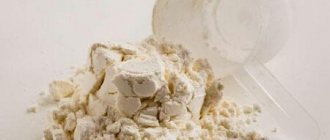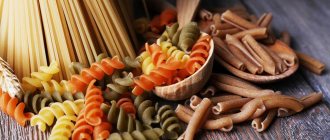Share:
Even the most strict diet involves the consumption of dairy products, because this is a source of protein and other valuable microelements. But some adherents of drying deliberately refuse milk, assuring that it causes a lot of “flooding”. Is it really? In what cases can milk, cottage cheese or cheese contribute to water retention in the body? Let's figure it out.
Myths
- “Dairy makes it flood” (dairy products retain water and as a result we swell).
- “Cottage cheese (let’s be a little more specific) contains milk sugar (lactose), and sugar contributes to insulin surges, and insulin stops all weight loss processes and fat accumulates.”.
Actually, for the same far-fetched reason about insulin, the myth about the ban on eating carbohydrates in the afternoon is so widely circulated among fitness people. “The cottage cheese is flooding.”
- “Milk has a high insulin index.”
- “Dairy interferes with growth hormone.”
Let's find out once and for all which dairy products are ok and which and why you can't eat them on a diet?
Not just salt
In addition to salt, excess creatine, which enters the body with meat and fish, retains water. Those with a sweet tooth also need to be careful: sugar and honey contribute to fullness and increase insulin levels. And those who like to indulge in alcohol should know that alcoholic drinks dehydrate, forcing the body to try to normalize the acid-base balance due to fluid retention.
Of course, people suffering from swelling should not forever deprive themselves of eggs, fish and meat dishes. The best solution is to prepare these products by steaming, boiling and stewing.
Milk
Why do people even think that milk can interfere with losing weight? This is due to our “beloved” father of the paleo diet ( which we can’t stand ) Cordain.
In the course of his “research”, he discovered that milk directly affects our weight: it promotes inflammatory processes in the body, provokes allergies and, as a result, we gain weight. In addition, evil milk and its friend cottage cheese destroy the immune system by not being digested in people’s stomachs.
Cordain even writes that milk and dairy derivatives change hormonal levels. The products promote the production of aldosterones, they make any sports fan “drenched in water”, in general, the circle closes and we feel that there is no way out of it.
Do you agree that this looks, to put it mildly, unscientific?
In the real world, it has long been proven that dairy products have extremely beneficial properties for losing weight: they give a long-lasting feeling of fullness. Some studies have shown that, for example, in people with calcium deficiency, milk helps curb hunger.
Several other data indicate that whey protein (casein) also satisfies well, increases the amount of insulin, and therefore allows you to not feel hungry for a longer time: when participants ate high-protein yogurt as a snack, at lunch They ate, on average, almost 200 fewer calories compared to those who ate regular yogurt!
Moreover, milk does not make you fat! In a study that lasted 1 year, increased consumption of dairy products at the same caloric intake did not affect participants' fat mass .
There are, of course, opposite experiments: for example, in one of them it was proven that consuming low-fat dairy products did not contribute to weight gain, but “fat milk” did the opposite.
True, no one thought about it or recorded the number of calories per day , so 99.9% of weight gain is associated with a banal excess of calories, and not with the product consumed!
So is it possible to drink milk while losing weight or not, is it useful for dieting? Of course yes! A huge number of high-quality studies have proven that in itself, even if increased consumption of dairy products does not affect body composition and weight gain! It's all about the number of calories and your tolerance (more on that below).
And you will find out the answer to the question whether you can drink milk at night or in the evening in the article Can and should you eat before bed?
Kefir
Let's start with a negative lesson right away: if you came up with the idea of a kefir diet or a fasting day, then throw it out of your head ( Detailed analysis of 25 effective options for fasting days for weight loss with examples and instructions on how to do it correctly ).
With all its advantages, kefir cannot provide the body with all the vitamins, minerals and fiber.
As a result, supporters of a strict kefir diet experience a slowdown in metabolism and weakened immunity. After all, all mono-diets are stress for the body.
Buckwheat mono-diet, rice, protein, chocolate, tomato are stressful for the body and kefir mono-diet is no exception. This is complete nonsense . Weight on a kefir diet, of course, is lost quickly, but it comes back just as quickly. Surely you won’t be able to drink kefir for the rest of your life?!
The answer to the question, “which kefir is healthier?” pretty simple. Nutritionist R.V. Moisenko writes that you should only buy fermented milk products with a shelf life of no more than one week. Typically, these requirements are met by locally produced kefirs, from dairies that are located nearby, and from Russian production.
If you bought “long-lasting” kefir, then it is better to ferment milk with it. By adding 200 ml of this product to 1 liter of plain milk and leaving the saucepan in the kitchen overnight, you will get fresh, probiotic-rich curdled milk for breakfast.
But long-lasting kefir itself may contain not only lactocultures, but also starch-based thickeners, and therefore cannot be considered an ideal healthy product.
Kefir is an excellent prebiotic; essentially, it is milk digested by bacteria. It contains lactic acid and bifidobacteria, which suppress the growth and development of pathogenic and putrefactive microorganisms. So, after just one to two weeks of regular consumption of kefir, phenolic and indole compounds disappear from the urine.
Plus, it is an easily digestible drink, the beneficial substances of which are quickly absorbed by the walls of the stomach and intestines and enter the bloodstream. Kefir helps regulate the functioning of our intestines.
It is especially useful for children who have had intestinal infections. Kefir restores normal intestinal microflora in case of dysbacteriosis and dysbiosis, helping to normalize biochemical reactions and physiological functions of the body.
It is also an affordable source of protein and calcium, which help strengthen bones and promote growth in children. Moreover, calcium from kefir is absorbed much better than, for example, from milk. Therefore, kefir can serve as an excellent prevention of osteoporosis, which often causes serious injuries in older people.
Depending on how long after preparation you consume kefir, it has different properties. If you drink freshly prepared kefir (the first day), it has a laxative effect, and after three days of storage, the kefir strengthens. Those. If you have constipation, it will not help you in any way, this is a misconception!
When to drink?
If you are trying to improve your intestinal flora, the answer to the question “when to drink kefir” should be clear. Drink when your stomach is as empty as possible . Moreover, use the product with a minimum of additives.
If you just use kefir for pleasure, then you can do it in the morning, during the day, in the evening and at night - this will neither help nor hinder you from losing weight, by the way.
There is an opinion that with its help you can say goodbye to swelling in the morning, because... Kefir has a mild diuretic effect and helps remove excess fluid from the body.
Fast diuretic products for edema
- freshly squeezed cucumber juice;
- fasting day on watermelons (relevant once a year, but still);
- infusion of dill seeds (just pour 1 tsp of dill seeds with a glass of boiling water and let stand for 15 minutes; drink 3 times a day);
- juice from parsley or the green part of celery;
- grated ginger root when added to hot drinks or cold water.
The Drain Effect drink will help quickly relieve puffiness. Everything goes away in 30-60 minutes. Useful and safe, based on plant extracts more details...
Try to eat foods that remove excess fluid on a daily basis. At least half of all your food during the day should be plant-based - raw salads. You can add a little olive oil. Flaxseed is even better, but you won’t find the real thing in stores, it’s poison. This way you will get an acceleration of metabolism, an improvement in the condition of blood vessels and the outflow of lymph through the capillaries. The body will thank you with good health and excellent appearance.
Cottage cheese
So, let’s look at the example of kefir: is it possible to have fermented milk products while losing weight? Let's look at the dairy issue from the perspective of its most popular representative - cottage cheese. Does the high insulin index of cottage cheese and dairy products interfere with the fat burning process?
What is the insulin index of products? Why is the insulin index of cottage cheese the No. 1 topic of discussion among athletes and lovers of all dairy products? The insulin index is a value that shows how much insulin is released into the blood when consuming any product.
We think that the concept of “food glycemic index” (GI) is familiar to everyone. In simple words, this is an indicator of how foods affect blood sugar levels.
The HIGHER the GI foods, the FASTER the blood sugar level will rise, and the FASTER the pancreas will react by releasing large amounts of the hormone insulin, the task of which is to process glucose into glycogen or store its excess as fat.
Basically, simple carbohydrates have a high GI: confectionery and bakery products, sweet fruits , dried fruits, etc.
We dealt with the glycemic index in the article “ Flexible Diet or Rubber Diet? “and found out that it has no effect on weight loss, but what is the danger of the insulin index, and what is its essence?
The insulin index is slightly different from the glycemic index. Here the pattern of insulin release into the blood is completely different. The fact is that the pancreas responds by releasing insulin not only to foods rich in carbohydrates, but also to other foods.
This suggests that insulin levels also rise after eating protein foods such as fish, meat, cottage cheese, nuts, etc.
Yes, cottage cheese contains 1.2 grams of carbohydrates. per 100 g., with a glycemic index of 30 units, does not increase blood sugar levels, but still stimulates the release of insulin. In fact, scientists from all over the world still cannot unanimously answer why this happens.
Perhaps this is a reaction to lactose, perhaps to casein breakdown products. However, lack of information does not change the fact that this is happening.
Not all foods have the same glycemic and insulin index. Quite often, the glycemic index of foods and their insulin index do not match! For example, the glycemic index of low-fat cottage cheese is 30, and the insulin index is 120 .
Despite the fact that cottage cheese does not raise blood sugar levels, the pancreas instantly reacts to the entry of cottage cheese into the body and releases a large amount of insulin.
Pre- and post-workout nutrition: carbohydrate window
“Oh, HORROR” many thought and stopped reading the articles at this point, without knowing the most important thing. With cottage cheese, we have a real problem: there is insulin, but there are almost no carbohydrates! So you can eat cottage cheese while on a weight loss diet.
Moreover, you can fearlessly eat cottage cheese in the evening or at night, no matter what kind (even if you are on a diet): low-fat or 9%.
As long as there is a calorie deficit (an honest and real deficit), a person will lose weight . That's all, no magic











